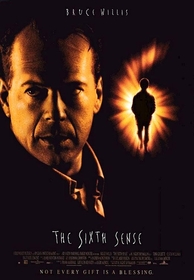Our editor-in-chief Nate Yapp is proud to have contributed to the new book Hidden Horror: A Celebration of 101 Underrated and Overlooked Fright Flicks, edited by Aaron Christensen. Another contributors include Anthony Timpone, B.J. Colangelo, Dave Alexander, Classic-Horror.com's own Robert C. Ring and John W. Bowen. Pick up a copy today from Amazon.com!
The Sixth Sense (1999)
If I remember correctly, the last time that I saw The Sixth Sense was in August of 1999. The exuberant - if poorly constructed - review I wrote then called it a "definite 100% must-see". Over time, though, my feelings for the film faded, and I feared that I had overrated it. I kept wondering if I had just been swept up in the buzz. Plagued by doubts as to my own critical competence, I was starting to believe the small but growing negative backlash against the flick. A recent second viewing of the flick taught me something.
Critic's Rule #1 - Never second-guess your feelings for a film.*
The Sixth Sense is exactly the deeply chilling horror film that it was over two years ago. More importantly, though, is that it is also a deeply moving drama. The real trick is that writer-director M. Night Shyamalan never chooses between the two genres, like so many directors would. Instead, he places realistic characters in realistic settings, and the enters an element of the fantastic. Perhaps this is why the whole thing is so effective. For a successful horror film, you have to care about the protagonists -- truly this could be said of any genre, but it is most often ignored or poorly handled in terror cinema.
Dr. Malcolm Crowe (Bruce Willis) is a child therapist in Philadelphia who suffers a traumatic ordeal at the hands of a patient he failed with. A few months later, he's looking to make up for his past mistake with a similar case: one Cole Sear (Haley Joel Osment), who is withdrawn and looks like he's always under persecution. Cole is from a divorced family and lives with his single mother (Toni Collette), who struggles to make ends meet. The children at school think Cole's a freak. But none of them know his dark secret...
The heart of this film's acting is trust. Despite the fact that Willis makes millions of dollars a picture, he's willing to step back and underplay his role, so that Osment, who is truly the best actor in the movie, can shine. I don't know of many stars that would allow the weight of the film to sit on such small shoulders, but Bruce knew what he was doing, because it works. Osment ably draws us into his world of childhood fear as if it was our own. Though he and Willis have excellent chemistry, his best scenes are with Collette. Each of their bits together is both touching and heart-wrenching. Though Collette at first seemed an unlikely candidate for the Best Supporting Actress Oscar nomination she received, upon a second look it's all too obvious. With very little screen time and no overacting, she creates a character of quiet desperation and compassion. Put her in a room with Osment, and the involvement of the viewer becomes overwhelming (in my case, we're talking honest-to-gosh tears at one point).
If Osment creates the emotion, than Shyamalan and cinematographer Tak Fujimoto make the mood. The style they use is one rarely seen, and it shouldn't be. The shot is usually focused on what is important for the viewer to see at that moment. This seems reasonable enough, but it's really surprising how much unnecessary camera work you have to cut through in even the simplest of films. In The Sixth Sense, the camera literally feels like our eye. This is rather slick, really, because it allows us to think that we're seeing everything while our perception is really being cloaked. However, while being lead by the nose, it is important to note the sinister look of the film. Shadows play around in dark corners. The color red punctuates moments of stress and adversity. Even in the daytime, there's something dead about this world.
Nobody likes being written down to -- it makes a person feel inadequate, somehow. However, writing a perceptive script like Shyamalan did is risky. Some people will simply write off the film because of its slow, thoughtful pace and its involved plot. Those willing to give The Sixth Sense a chance will discover something beautiful -- a screenplay that doesn't equate intelligence with wordiness. There are very few speeches, and none of them are long winded. What's important here are the individual moments between characters. I think it can only be a positive thing that character development in this movie is equally about what is said and what is not.
My only qualms are plotting decisions related to the ending. I'm not going to describe them in any detail, as I do not wish to spoil the ending for whoever is not aware of it. Let's just say that Shyamalan breaks some important rules of storytelling in order to make certain parts of the movie work.
I'm glad that I gave The Sixth Sense a second chance. How else would I have rediscovered one of the best horror films of all time? I suggest that you also find time to watch this film, if for the first time or the tenth. The Vista Series DVD is loaded with documentaries and special features galore. I urge you to check it out immediately.
* Rules 2-5 involve brushing your teeth, proper dog grooming, ballroom dancing etiquette, and holding the door open for your elders and betters. There is also an addendum that gives helpful suggestions on how to cope with the total loss of any semblance of a life.
Trivia:
Nominated for 7 Academy Awards, including Best Picture, Director, Original Screenplay, Supporting Actor and Actress. It unfortunately won none of them.








